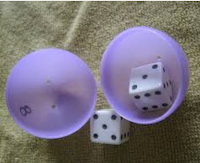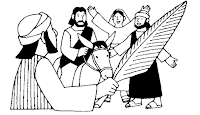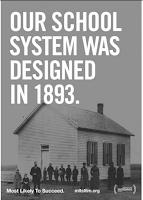 For the four days this week we have gathered as a school to retell the story of Easter. Holy Week is one of the most important weeks in the Catholic Liturgical year and began last weekend on Palm Sunday.
For the four days this week we have gathered as a school to retell the story of Easter. Holy Week is one of the most important weeks in the Catholic Liturgical year and began last weekend on Palm Sunday. We have used a resource called the Resurrection Eggs to help break open the Gospel readings for the children. Each day we have opened three eggs to find out the symbols inside - these symbols help us retell the story.
Thanks so much to our DRS Suzanne Newton and our Year 8 Special Character Leaders for organising these very special mornings for us.
MONDAY
 Egg #1: Donkey Jesus rode a donkey into
Jerusalem. In times of
peace, a king would ride a
donkey. We celebrate this
on Palm Sunday.
Egg #1: Donkey Jesus rode a donkey into
Jerusalem. In times of
peace, a king would ride a
donkey. We celebrate this
on Palm Sunday. Egg #2: Coins
Judas betrayed Jesus for 30 silver coins. The Jewish leaders did not believe Jesus. They wanted him to die.
Egg #3: Cup
Jesus and his followers drank from a cup. They were together for the Passover meal. This was the last meal before Jesus died. It is called the Last Supper.
TUESDAY
 Egg #4: Praying hands
Egg #4: Praying hands Jesus went to a garden to pray. The garden was called the Garden of Gethsemane. Jesus was sad. But He knew that He must die.
Egg #5: Leather strap
Jesus was whipped. They used leather straps to hit Jesus.
Egg #6: Crown of thorns
The soldiers placed a crown of thorns on Jesus’ head.
WEDNESDAY
Egg #7: Nails
We do wrong things. We do not obey God. God is perfect. Jesus never did anything wrong. But, Jesus was nailed to a cross. Three nails were driven into Jesus’ hands and feet. Jesus died for us. He died instead of us. Now we can come to God – because of Jesus.
 Egg #8: Die (Dice)
Egg #8: Die (Dice) Jesus was on the cross dying. The soldiers played a game using dice. They wanted Jesus’ clothes.
Egg #9: Spear
Jesus was on the cross. Soldiers put a spear into his side. Jesus was dead.
HOLY THURSDAY
Egg #10: Linen
They took Jesus from the cross. Joseph was a follower of Jesus. He wrapped Jesus’ body in a linen cloth. Joseph put Jesus’ body in a tomb.
Egg #11: Stone
A very large stone was placed in front of the tomb. The stone protected the tomb. No one could get in or out. Some women came to the tomb early on Sunday morning. The stone had been moved!
Egg #12: Empty
The women looked in the tomb. Jesus was not there! An angel appeared. He said, “Jesus is not here. He has risen.” He is still alive today.




